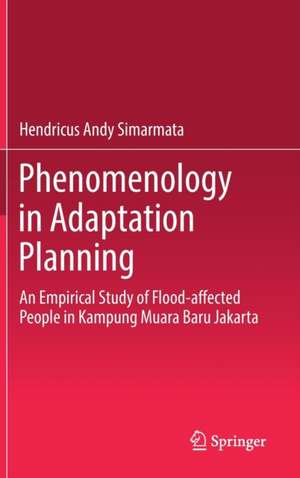Phenomenology in Adaptation Planning: An Empirical Study of Flood-affected People in Kampung Muara Baru Jakarta
Autor Hendricus Andy Simarmataen Limba Engleză Hardback – 4 sep 2017
| Toate formatele și edițiile | Preț | Express |
|---|---|---|
| Paperback (1) | 384.70 lei 6-8 săpt. | |
| Springer Nature Singapore – 29 dec 2018 | 384.70 lei 6-8 săpt. | |
| Hardback (1) | 391.99 lei 6-8 săpt. | |
| Springer Nature Singapore – 4 sep 2017 | 391.99 lei 6-8 săpt. |
Preț: 391.99 lei
Nou
Puncte Express: 588
Preț estimativ în valută:
75.02€ • 77.66$ • 63.41£
75.02€ • 77.66$ • 63.41£
Carte tipărită la comandă
Livrare economică 06-20 martie
Preluare comenzi: 021 569.72.76
Specificații
ISBN-13: 9789811054952
ISBN-10: 9811054959
Pagini: 150
Ilustrații: XXIX, 203 p. 48 illus., 30 illus. in color.
Dimensiuni: 155 x 235 mm
Greutate: 0.51 kg
Ediția:1st ed. 2018
Editura: Springer Nature Singapore
Colecția Springer
Locul publicării:Singapore, Singapore
ISBN-10: 9811054959
Pagini: 150
Ilustrații: XXIX, 203 p. 48 illus., 30 illus. in color.
Dimensiuni: 155 x 235 mm
Greutate: 0.51 kg
Ediția:1st ed. 2018
Editura: Springer Nature Singapore
Colecția Springer
Locul publicării:Singapore, Singapore
Cuprins
1 Introduction.- 2 Conceptual Framework.- 3 Methodology.- 4 Planning Institutions of Adaptation to Flood in Jakarta.- 5 Interplay between the Floods and the Poor.- 6 Flood Experiences: “The Vulnerable” and “the Adapter”.- 7 Living with Floods: Locally Embedded Adaptation Planning.- 8 Institutionalization and Reification of Locally Embedded Adaptation Planning.- 9 Vulnerability, Adaptation, and Planning: A Kampung Trilogy.- Reference.- Appendices.
Notă biografică
Andy Simarmata earned his DPhil (Ph.D.) in Development Studies with magna cum laude predicate from one of the leading research universities in Germany, The University of Bonn. He has fifteen years of experience in research, technical assistance and advocacy. In the last seven years, he has focused his works on climate change adaptation, urban resilience and spatial planning. He currently works as a senior lecturer at urban development studies postgraduate program in Universitas Indonesia, Jakarta. He also serves as the Secretary General for Indonesian Association of Urban and Regional Planners (IAP) and is a certified urban planner. Following his doctoral research that investigated the inter-relational concepts among vulnerability, adaptation, and planning from humanist philosophical approach, his research now examines the extent to which people dimensions flourish urban planning and how humanistic urban planning contributes to more resilient and sustainable cities. He has publishedvarious journal articles in peer-reviewed journals and book chapters. He is also the World Social Science (WSS) fellow on sustainable urbanisation, awarded by the International Social Science Council (ISSC) in 2014.
Textul de pe ultima copertă
This book explores the planning knowledge that can be gleaned from the experiences of the urban poor, a group frequently affected by floods. Further, it examines the relationship between lifeworld analysis and adaptation planning through the sociology of knowledge, which plays a significant part in determining the adaptation pathway of the urban poor. The book brings together empirical data to translate self-reflective planning theory into the practical context, examines community planning, and enriches the discourse on urban adaptation. Lastly, it provides an adaptation-planning model that can benefit academics, practitioners and policymakers who wish to provide more socially accepted plans.
Caracteristici
Uses lifeworld analysis as a lens to reveal planning knowledge with regard to adaptation Builds on Schön’s idea of “reflective practitioners” Helps refine community-based adaptation models Provides a humanistic perspective on the phenomenology of planning Examines the transformation process of local people in the discourse on micro-sustainability
